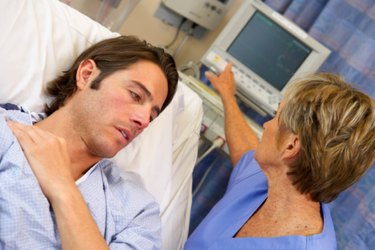
Jogging up a few flights of stairs or chasing your kids around the backyard can easily cause your heart rate and respiration to increase. In these types of situations, heart rate and respiration changes are typically harmless and often correct themselves with a few minutes of rest. However, there are several situations where an increased heart rate and shortness of breath indicate a very serious medical problem.
Tachycardia
Video of the Day
Tachycardia refers to a symptom of increased heart rate. The normal resting heart rate for a healthy adult is between 60 and 100 beats per minutes. A person with tachycardia has a resting heart rate above this normal heart rate. MayoClinic.com explains that electrical signals sent across the heart are responsible for controlling heart rate. When these electrical signals become abnormal, they cause one or more of the heart's chambers to beat rapidly. When the heart beats too rapidly, the heart's chambers have a difficult time filling with blood between heart beats. As a result, the heart may be unable to deliver an adequate amount of blood to the body.
Video of the Day
Dyspnea
Dyspnea, or shortness of breath, occurs when the body is unable to balance its exchange of oxygen and carbon dioxide. This feeling of breathlessness often causes you to feel as though you cannot catch your breath or inhale a sufficient amount of oxygen. Other symptoms might include wheezing, weakness, fatigue and tightness in the chest. If left untreated, shortness of breath can lead to a significant imbalance between the oxygen and carbon dioxide levels in the body.
Relationship
Since the heart and lungs work together in a close relationship, a problem with one of these organs almost always affects the other. For example, lung problems that cause shortness of breath often cause an accumulation of fluids in the lungs or in the right side of the heart. As the heart tries to pump against this increased pressure, the heart must beat faster and harder to work efficiently. On the other hand, a heart problem might initially cause the heart to beat rapidly. In response to the increased heart rate, respiration also increases to deliver enough oxygen to the blood.
Heart Problems
A wide variety of heart problems can cause increased heart rate and shortness of breath. These problems include electrical conduction disorders, atrial/ventricular fibrillation, high blood pressure and arrhythmias. Any type of heart inflammation, such as endocarditis or myocarditis, or accumulation of fluids around the heart can also cause tachycardia and dyspnea. Other potential causes of these dangerous symptoms include heart attack and congestive heart failure.
Lung Problems
As with the heart, fluid accumulation around the lungs can also cause shortness of breath and tachycardia. This fluid accumulation, known as pleural effusion, may be caused by an infection or irritation of lung tissue. Other lung problems include pneumonia, upper respiratory infections, blood clots and a collapsed lung. Respiratory diseases include asthma, bronchitis and chronic obstructive pulmonary disease. Occasionally, shortness of breath might also be caused by a blockage in the lung, such as a tumor or food lodged in the airway.